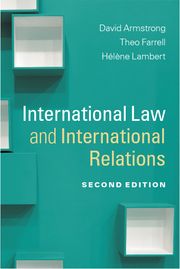International Law and International Relations - 2nd Edition
Hélène LAMBERT, David ARMSTRONG, Theo FARRELL
Availability: Out of stock - available in 10 open days
- Categories: External Relations, Public International Law
- Publisher: CAMBRIDGE UNIVERSITY PRESS
- ISBN: 9781107648241
- Publication Date: 15/03/2012
- Binding: Paperback
- Number of pages: 364
Summary
In this fully updated and revised edition, the authors explore the evolution, nature and function of international law in world politics and situate international law in its historical and political context. They propose three interdisciplinary 'lenses' (realist, liberal and constructivist) through which to view the role of international law in world politics and suggest that the concept of an international society provides the overall context within which international legal developments occur. These theoretical perspectives offer different ways of looking at international law in terms of what it is, how it works and how it changes. Topics covered include the use of force, international crimes, human rights, international trade and the environment. The new edition also contains more material on non-western perspectives, international institutions and non-state actors and a new bibliography. Each chapter features discussion questions and guides to further reading.
• Clear and accessible introduction which makes international law understandable to students of international relations and law
• New edition is fully updated and contains new material on international crime, non-western perspectives, the role of international institutions and other non-state actors, and 'English School' theory
• Brings leading theories together with key events (the Iraq War, the Libyan intervention, the creation of the International Criminal Court) to show the impact of law on world politics
Table of contents
Preface to the second edition;
Introduction;
Part I. The Foundations:
1. The nature of international law;
2. The evolution of international law;
3. Three lenses: realism, liberalism and constructivism;
Part II. The Law in World Politics:
4. Use of force;
5. Human rights;
6. International crimes;
7. International trade;
8. The environment;
Part III. Conclusions:
9. Law and power in an evolving world order.
